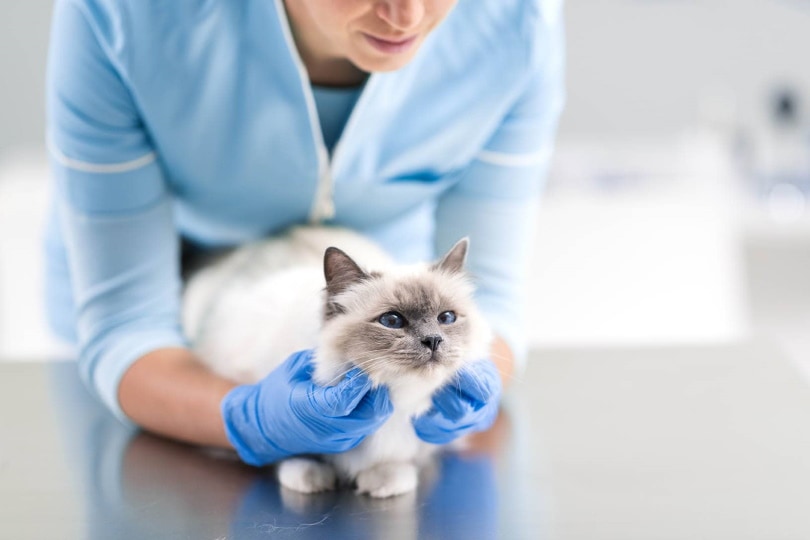
The Birman is a relatively new addition to the cat family. They are known for their unique coloring, which includes a light cream and dark brown coat with a black mask. They are also quite playful, making them great companions for people who want an active pet.
These friendly cats are social creatures that enjoy lounging around, playing, and spending time with their families. With their long fur coats and bright eye colors, Birman cats have a unique appearance that is sure to turn heads. They make great additions to any family and are known for being affectionate and loving. However, these cats are also prone to several health problems, so they should be checked regularly for these conditions by their vet.
Read on to learn about all the issues that could affect your Birman kitty and how to prevent and treat them.
Top 11 Birman Cat Health Problems
1. Kidney Disease
Kidney disease is a particular health concern for Birman cats. Some kittens have been found to have impaired kidney function, and others go on to develop kidney failure. Polycystic kidney disease is an inherited kidney condition seen in Birman cats. The disease can cause the kidneys to fail, which can eventually lead to death. Signs of kidney disease include excessive drinking and urination, weight loss, and vomiting.
Treatment for kidney disease includes dietary changes and medications to help the kidneys function properly.

2. Obesity
Birman cats are at an increased risk of developing obesity due to lack of physical activity or if they have a propensity for overeating. Obesity can lead to a number of health problems, such as diabetes, heart disease, and joint problems. It is important to keep your Birman cat at a healthy weight by providing them with a nutritious diet and plenty of exercise.
3. Anxiety
As active and social cats, Birmans are susceptible to health problems like anxiety due to isolation. This condition can be caused by a number of factors, such as a lack of socialization, boredom, and fear. Signs of anxiety from isolation can include aggression, excessive grooming, vocalization, and urination or defecation in inappropriate places. If left untreated, this condition can lead to serious physical and behavioral problems.

4. Dental Disease
Dental disease is a common health problem in all cats, as well as Birman cats. The disease can cause pain and inflammation in the mouth and can lead to problems with eating and swallowing. In severe cases, dental disease can even cause death. Treatment typically involves the regular cleaning of the teeth and gums, along with antibiotics or other medications if necessary.
5. Infections Preventable by Vaccine
Birman cats are susceptible to a variety of vaccine-preventable infections, including both viral and bacterial infections. The most common viral infection in Birmans is feline herpesvirus 1 (FHV-1), which can cause severe eye and respiratory disease. The most common bacterial infection is Bordetella bronchiseptica, which can cause severe respiratory illness. Vaccination against these infections is important to protect your Birman cat from a potentially serious illness.

6. Parasites
Birmans and all other cats are susceptible to a variety of parasites, including roundworms, tapeworms, and fleas. Parasites can cause health problems in cats, such as diarrhea, vomiting, and weight loss. In severe cases, parasites can even lead to death. Parasite prevention is important for all cats, especially for those that live in areas where parasites are common. Cats should be treated for parasites regularly and should also be vaccinated against common parasites.
7. Hemophilia
Birman cats are predisposed to developing hemophilia B, a genetic disorder that causes abnormal clotting of the blood. This can lead to excessive bleeding and bruising, as well as internal bleeding in the brain, intestines, or other organs. There is currently no cure for hemophilia, but treatment options are available to help manage the condition.

8. Rare Blood Type
Unfortunately, many purebred cats have rare blood types, which can mean that if they need a transfusion, it can be difficult to find a donor. All cats have different blood types. Domestic cats usually have type A blood, whereas purebred cats, like Birmans, have type B or rarely, type AB blood.
You should know your cat’s blood type before transfusion, as it can save precious minutes. For all cats but especially for purebreds, blood typing is recommended. The results of a blood type blood test can be added to your pet’s microchip record.
9. Cataracts
Cataracts are a common health problem in Birman cats. They are a clouding of the lens in the eye that can lead to vision loss. There are different causes of cataracts, with age, genetics, or exposure to sunlight being among them. Signs of cataracts include blurred vision and difficulty seeing in low light. Cataracts can be treated with surgery.

10. Hypotrichosis
Hypotrichosis is a health problem that can affect Birman cats. It is a genetic disease that causes the cats to be born hairless. There is no cure for this disorder, and affected cats will unfortunately usually die before 8 months of age. The faulty genes need to be inherited from both parent cats.
11. Feline Mucopolysaccharidosis Vl
This is another genetic disease that can be seen in Birmans and other breeds, causing a deficiency in enzymes involved in breaking down glycosaminoglycans. It causes problems with growth and maturity.

Final Thoughts
In conclusion, Birman cats are susceptible to several health problems. Some of these can be mild and easily treated, while others can be life threatening. It is important for Birman owners to be aware of these problems and to seek veterinary care if their cat shows any signs of illness.
Health issues in Birmans can be costly, worrying, and frustrating for their owners. By being aware of these issues and taking the necessary precautions, however, owners can minimize the chances of their cats developing them. Genetic tests are available for some of the conditions, such as polycystic kidney disease. Birman cats are loving and intelligent creatures, and with proper care, they can make wonderful pets.
You may also be interested in:
Featured Image Credit: Stock-Asso, Shutterstock








